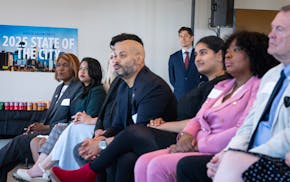Opinion editor's note: Strib Voices publishes a mix of material from 11 contributing columnists, along with other commentary online and in print each day. To contribute, click here.
•••
When I awoke the first morning after Easter Sunday to learn of Pope Francis' death, the first tributes to him I saw were from a Jewish person and a gay Methodist pastor. That was fitting for a pope who represented the best of an inclusive Catholic Church, and, if I may, an inclusive Gospel of Jesus himself.
The Catholic Church is perhaps better known throughout history for its exclusion, abuse, violence and stodginess, at least as portrayed in popular culture. But it was that inclusive bent of Vatican II and trailblazing and social justice-oriented Catholicism that touched my life most deeply, made evident in the past 12 years that Francis served as leader of the world's largest religious institution.
As a Lutheran pastor, people sometimes questioned my work for Catholic publications like U.S. Catholic magazine where I've been a frequent contributor on conservative American Catholicism. But like I said, what I saw of the Catholic Church was much more open and accepting than the traditionalist, fundamentalist caricature of religion preferred by American right-wing politicians and financiers.
I sometimes say I'm half-Catholic, which Francis might not have liked, but my Catholic dad's side of the family, rooted in hardworking, rural Midwestern (Stearns County in Minnesota) German Catholicism nonetheless drew inspiration from his leadership. My Catholic cousins worked in low-income Catholic schools after graduating from places like Notre Dame and the University of St. Thomas. One of them still works for a rural Midwestern diocese; others continue to teach in parochial schools. Another has been a longtime leader in Habitat for Humanity.
Francis comes from the church that has spawned brilliant, courageous and even irreverent (when it comes to unholy hierarchy) religious sisters like Simone Campbell, a lawyer who led the Network Lobby for Catholic Social Justice for 17 years, fighting for health care and social services for the poor, leading Pope Benedict's Congregation for the Doctrine of the Faith to investigate the organization for being a "negative influence."
It was Francis' church that reminded religious sisters like Campbell and social justice-leaning Catholics all over the world that they were still welcome — even celebrated — under its vast umbrella. And I know it was Francis' church that invited me — a Lutheran pastor — to share a message, albeit before the official beginning of the Mass, at a large Catholic parish in Minneapolis in January 2020.
In the wake of Francis' death, in a country and a world beset by contempt for the earth, for the immigrants, migrants and poor people he championed, where do we now look for morality, compassion and hope in Christianity? Did Francis hold on for one last Easter, hold on to bear witness again to love of neighbor in the face of a U.S. vice president and Catholic convert who visited him hours before his death and who has profaned Jesus' teaching to suggest it applies only to one's family and tribe?
After years of reporting on conservative and traditionalist Catholics, I've heard on several occasions that these right-wing Catholics never really saw Francis as their pope. These right-wing leaders saw Francis as a liberal interloper. Their preference for the supposed doctrinal purity of Benedict was clear, and they as much as said that Benedict remained their "true" pope.
But ultimately it was never about doctrine or theology. For Francis was never primarily a theologian, as many have noted. He was first always a pastor, and as all pastors know: This job will do a number on your ego. For you to maintain any kind of integrity in this work as God's servant, you have to be humble. The first step is admitting, in any situation, that you might be wrong. Only then can God do God's best work in you and through you.
This was Francis' greatest gift to the world, and one I fear that the church's leading conservatives and traditionalists — both in the Vatican and in America — will work as quickly as possible to unwind. It was his humility that undid them. They couldn't stand to watch him bend and wash the feet of women, Muslims and youth detainees at a detention center in Rome, as he did on his first Maundy Thursday as pope, way back in 2013.
What they want most out of religion is a harsh judgment of anyone but themselves, and so they vowed revenge when Francis, in that same year, said of gay priests: "We shouldn't marginalize people for this … if someone is gay and he searches for the Lord and has good will, who am I to judge?"
These same words that sent reactionary American conservatives tearing their navy suits in grief and anger led young gay Christian people across the world, like my friend, Guthrie Graves-Fitzsimmons of the Interfaith Alliance, to relieved and joyful tears.
"Francis' change of posture toward the community let light shine in the darkness," Graves-Fitzsimmons wrote this week.
Today, we mourn a lasting witness for a humbler, gentler and more righteous world.
Perhaps as a Lutheran I have no right to claim a tiny piece of Francis' legacy. But I think Francis' church — and Francis' God — is big enough to serve us all.

Rash: At home, Jake Sullivan reflects on events abroad

Opinion: Let's not lose sight of what's best for older adults

Readers Write: Minneapolis politics, Trump's budget, hot tub rentals
